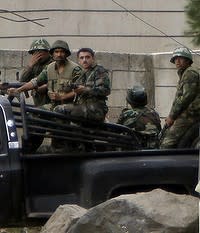 The Envoy
The EnvoyIn shift, Turkey signals support for anti-Assad Syria militia group

Turkey, whose leadership once hesitated to break relations with Syria's Bashar al-Assad regime, is now giving shelter to some 60 to 70 members of an anti-Assad militia group called the Free Syrian Army, the New York Times' Liam Stock reports.
"Composed of defectors from the Syrian armed forces," the Free Syrian Army has found refuge in "a heavily guarded refugee camp in Turkey," Stack wrote from Antakya, Turkey Thursday. From that base, the Syrian rebels launched attacks that they claimed killed nine Syrian soldiers on Wednesday, Stack reported.
"Turkish officials describe their relationship with the group's commander, Col. Riad al-As'aad, and the 60 to 70 members living in the 'officer's camp' as purely humanitarian," Stack noted. But he also made clear the characterization was fairly laughable.
Indeed, the Turkish Foreign Ministry not only took pains to arrange the interview for Stack with the commander of the Free Syrian Forces, he writes. He could also hardly fail to notice that when Col. As'aad showed up at the office of a local Turkish government official where the interview had been arranged, the commander "arrived protected by a contingent of 10 heavily armed Turkish soldiers, including one sniper." Actions speak louder than words, perhaps?
"We will fight the regime until it falls and build a new period of stability and safety in Syria," Colonel As'aad vowed.
Ankara's demonstration of support for the anti-Assad militia marks a dramatic shift that was months in the making. Turkish Prime Minister Recep Tayyip Erdogan previously spent years trying to cultivate cordial relations with Assad, and was thus slow to harden his stance against the Assad's regime's brutal crackdown on the pro-democracy protestors in Syria. According to UN estimates, more than 3,000 Syrians have been killed in unrest in the country since last March.
"Prior to the current uprising, Turkey looked at Syria as a cornerstone in its plans to become a political, economic and 'moral' leader in the Middle East," Turkey-based analyst Yigal Schleifer wrote in an October analysis for the U.S. Institute of Peace. Such strategic considerations "shaped Ankara's initial caution in completely breaking with Damascus and could still limit the scope of Turkish action against the Assad regime."
Indeed, opposition leaders in Syria had previously accused Turkey of turning over Syrian defectors back to the Damascus regime.
One key question going forward is what sort of real pressure the Free Syrian militia may place on the Assad regime. Stack's sources suggest for now that the more significant development for Assad is the loss of Turkey as a regional ally that the group's sheltering there represents. While the militia is currently "too small to pose any real challenge to Mr. Assad's government," Stack wrote, "its Turkish support underlines how combustible, and resilient, Syria's uprising has proven."
"This pushes Turkish policy further towards active intervention in Syria," International Crisis Group Turkish analyst Hugh Pope told Stack. Ankara's conspicuous support for the militia signals "completely new territory," he added.
Other popular Yahoo! News stories:
• Obama White House escalates war on "leading from behind"
• Iraq vet has fractured skull from 'police projectile' at Occupy Oakland: report
• John Huntsman talks to Yahoo News about the tea party, the polls--and his hair
• Shipwreck off Japan thought to be 13th century Kublai Khan "lost fleet"
Want more of our best national security stories? Visit The Envoy or connect with us on Facebook and on Twitter.
